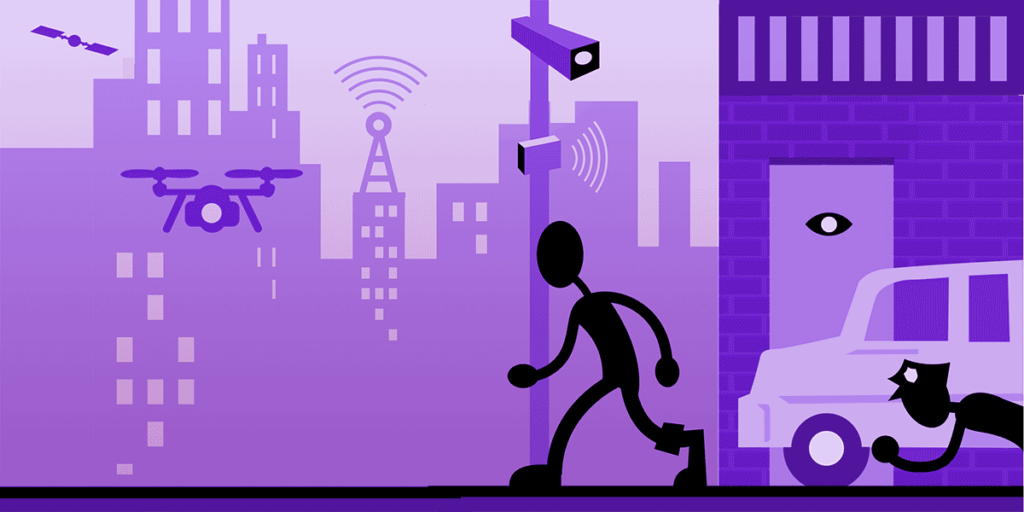Technology based on artificial intelligence is influencing every part of our personal and professional lives. The same is true with policing. Police personnel has been employing software for crime prevention, crowd control, and facial recognition for several years.

In recent years, the rate of AI usage for security objectives has accelerated. AI has recently aided in the development and delivery of unique police services, the connection between police and citizens, building trust, and the strengthening of ties with communities. Smart technologies including biometrics, facial recognition, smart cameras, and video surveillance systems are increasing in use. According to recent research, communities could cut crime by 30 to 40% and emergency service response times by 20 to 35% with smart technologies like AI. The same study discovered that communities are beginning to spend money on crowd control, gunshot detection, and real-time crime mapping. For the purpose of ensuring public safety, cities are utilizing facial recognition and biometrics (84%), in-car and body cameras for police (55%), drones and aerial surveillance (46%) as well as crowdsourcing crime reporting and emergency apps (39%). But only 8% of police departments embrace data-driven policing. According to the AI Global Surveillance (AIGS) Index 2019, 56 out of 176 nations deployed AI for surveillance for safe city platforms but using various methods. By 2022, 40% of police departments, according to the International Data Corporation (IDC), will be using digital tools, like shared workflows and live video streaming, to promote community safety.
Surveillance
Although surveillance is nothing new, cities are exploring the potential of evaluating surveillance data to forecast crime to increase security. Cities already take pictures for surveillance, but with AI, those pictures can be analyzed and used much more swiftly. It is now possible to sort through vast amounts of data on crime and terrorism and find patterns, correlations, and trends thanks to machine learning and big data analysis. Technology is the layer that helps law enforcement agencies to better do their duties and incite behavior change when the correct relationships are in place. The ultimate objective is to develop flexible security systems that are capable of identifying criminal or terrorist networks, and suspicious activities, and even helping to improve the efficiency of judicial institutions.

RoboCops
As AI’s best use right now is shifting through vast amounts of data and using that as predictions for future crimes that is not where is it being limited. The rising technology of robots being paired with AI to help patrol the streets is coming to life as you read this. The deployment of robots in the San Francisco police department was approved by city council members in November 2022. These robots were equipped with the ability to use lethal force to prevent crime and aid police officers in taking down dangerous criminals. But after a significant outcry from the public, the city was obliged to reverse its decision just under a month after it had been approved. Robots are still employed by the San Francisco police department despite the ban on using fatal force. Other places of the world are also experiencing the same thing. For instance, China intends to place robots with artificial intelligence (AI) in most of its cities by 2025. Thus, over the next 30 years, South Korea plans to outfit its police force with Iron Man-like outfits and robotic dogs to patrol the streets. Here is a summary of the advantages of deploying robots in law enforcement and their morality considering it.
While personally I do not think that robots should be equiped with anything to cause harm to humans at the moment there is more practical uses of robots in the police force. For example, the 400-pound robot known as HP RoboCop was unveiled by the Huntington Park Police Department as its newest officer. Since then, it has been policing Salt Lake Park in California and assisting with arrests. Imagine a group of these robots working together to lay down a security net around the city; this would significantly lower crime. The police department was able to find criminals with evidence in 6–8 hours thanks to this particular robot!
Conclusion
I believe that AI and technology can help keep the streets a much safer place. I believe we are not far from having robots roam the streets scanning faces and tracking data. However, I do believe we are far from having robots roaming the streets with any type of weapon. There are lots of ethical and moralities that conflict with the idea of robots have the power of killing anyone. Robots can take control of traffic violations and surveillance making there less of a need for cops in everyday use. Instead, cops can now have a bigger focus on bigger issues in our society rather than just roaming the streets looking for trouble. What are your thoughts on robo-cops? Scary or cool? Would you feel safer with robots scanning public parks/ neighborhoods?